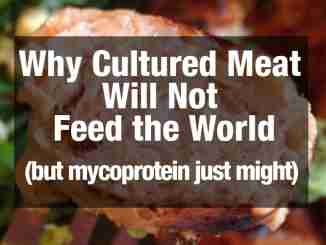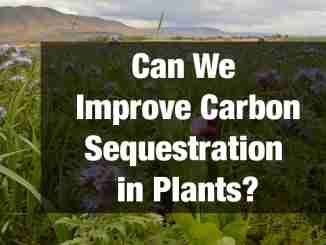What Would It Take to Feed the Entire Human Population with Nothing but Mycoprotein?
A little back of the envelope math looking at the production requirements for feeding the world using nothing but mycoprotein synthesized from atmospheric CO2.
A little back of the envelope math looking at the production requirements for feeding the world using nothing but mycoprotein synthesized from atmospheric CO2.

It may seem like cultured meat will be one of the best technology options for future sustainable food production. Here we address the misconception that cultured meat somehow will have the capacity to “feed all of humanity” in the near future.
‘Women are the first victims of climate change’, said Dumont at the 4th World Congress on Agroforestry in Montpellier, France, in May, ‘because they depend on tree resources’.
To meet the considerable challenge of ensuring food security for the future, it is imperative to find alternative and sustainable sources of protein, both for direct human consumption and for animal feed. Insect-derived proteins are one possible solution. Insects, especially fly larvae, have many qualities that make them well adapted to animal feed.
As current anti-immigrant policies diminish the supply of migrant workers, farmers are not able to find the labor they need. So, in states such as Arizona, Idaho, and Washington that grow labor-intensive crops like onions, apples and tomatoes, prison systems have responded by leasing convicts to growers desperate for workers.
As countries develop, demand for meat often rises, increasing the temptation to further expand livestock-grazing areas into new frontiers. But, contrary to many predictions, global pastureland has waned, even in agricultural powerhouses like Brazil and mega-populous countries like China.
“I see circumstances under which it could be useful for short-cutting a process that for traditional breeding might take many plant generations,” says Tom Willey, an organic farmer emeritus from California. The disruption of natural ecosystems is a major challenge to agriculture, Willey told me, and while the problem cannot be wholly addressed by genome editing, it could lend an opportunity to “reach back into genomes of the wild ancestors of crop species to recapture genetic material” that has been lost through millennia of breeding for high yields.
Sewage sludge doesn’t have much value as fertilizer. Could extracting the valuable elements put it to better use?
Alison Bernstein responds with clarification to misuse of her seminal essay on acute and chronic-toxicity assessments.
The EU and member states are moving to ban neonicotinoid insecticides. But two recently released reports on the issue conclude that a ban would push farmers back to using pest control options that are worse for the environment and possibly for bees as well.

And here …The planet’s plants pull CO2 out of the atmosphere and store it in their leaves, stems and roots. Some of that carbon makes its way into the soil, and some of that soil carbon is ultimately mothballed for millennia.
These days, though, “we as humans are putting up so much CO2 that the Earth is not able to compensate,” says Wolfgang Busch, a plant biologist with the Salk Institute for Biological Studies in La Jolla, California. Busch is working on a new project: to design plants that can suck even more CO2 out of the atmosphere and lock it away for centuries.
Before there was a general understanding of the benefits of native vegetation and the risks of invasive plants — introduced species that outcompete other species, spread quickly and alter ecosystems — USDA had a hand in introducing foreign plants that proved aggressive. Long ago, the agency promoted kudzu for erosion control. Now it works to control invasive species and does not provide assistance for planting them. It also actively promotes the use of native species through some programs.
Vineyards across the U.S. and Italy are being devastated by incurable diseases caused by bacteria hitching a ride on leafhoppers — a diverse group of plant-piercing insects closely related to cicadas. Now, thanks to some innovative research, scientists are using a technique called vibrational mating disruption to interrupt male-leafhopper courtship songs, preventing them from finding mates and slowing population growth.
The intersection of Central and Lowry Avenues in northeast Minneapolis is bustling. On the northwest corner is a trifecta of local businesses: A bike shop, a cooperative brewery, and a bakery. The neighborhood grocery co-op is one block up the street.
This commercial stretch didn’t always look like this.
‘Food loss and waste also amount to a major squandering of resources including water, land, energy, labour and capital,’ said Professor Montse Jorba Rafart, an expert in agrifood technologies from Leitat, a Spanish technological centre.
Instead, this waste could become a sustainable solution for another resource-heavy agricultural sector – animal feed.
It would not be possible to feed 7.6 billion people today without pesticides – let alone the 9-10 billion expected by 2050. So as well as being cautious and sparing in pesticide usage, let’s also give them some praise.
Global shifts of urbanization, migration, markets and climate can potentially be compatible with agrobiodiversity, but other powerful forces are undermining it. The imperatives of producing food at lower cost and higher yield clash with efforts to raise high-quality food and protect the environment.
A sophisticated form of artificial intelligence known as deep learning could help make agriculture more efficient and environmentally friendly.
According to the FAO, 30% of food is lost or wasted along the supply chain every year. This is a whopping 1.3 billion metric tons of food that doesn’t ever reach the consumer. This lost or wasted food could be used to feed 1.6 billion people every year. In Africa, the losses are even higher: between 30% and 50%.
Three examples of genetic engineering of crops show that extremely modest engineered changes in plant genetics can result in very important benefits. These three examples involve engineered changes that trigger the natural defenses of the plant without introducing novel defense mechanisms.
Copyright © 2020 | WordPress Theme by MH Themes